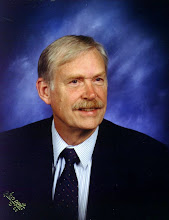I reversed the order; I should have written about Julius Caesar first and then George Patton. But, as luck would have it, I wrote about Patton first.
It was because my first cousin and his wife knew Patton personally. He served under Patton as HQ Commandant in Ft. Benning, GA, and on in to the invasion of North Africa. He saw Patton from time to time afterwards while he was HQ Commandant for Mark W. Clark.
I was writing about my cousin’s adventures as a country boy from Kentucky. He was the only such person I ever heard of who also knew Winston Churchill, the Sultan of Morocco and King George, VI. That book will be out this year (2005) and it will be called Full Duty.
After I sent the book to the publisher, I began another project. It was a novel about people in Rome in 50 B.C. Somehow, Julius Caesar got involved in the story and I found that he was as much fun to write about as was George Patton. I also saw a connection between the two men I had not thought of before.
Now, pop and clinical psychology are not my favorite topics. I avoid them whenever possible. Unhappily, when several of the Patton books were written, pop psychology was in vogue. Each author felt led to analyze Patton in a psychological manner, which probably led to faulty analyses and faulty images of this great man. From my point of view, the authors cheapened Patton. No doubt some authors tried the same technique on Gaius Julius Caesar.
Without the aid of psychological claptrap, one can see there were similarities in the lives of the two men. Both Caesar and Patton were leaders of men, who knew how obtain their respect. Caesar was a politician, while Patton had the ability but not the desire to be politic. Both men had a strong sense of purpose and a single-minded vision of what ought to be.
Both Caesar and Patton were students of history. Caesar was aware of Alexander the Great and must have known that he fell short of Alexander’s achievements. Patton knew of both men and many others besides. He knew of their battles and their battle sites and their battle plans. It may be possible that Patton saw himself as a modern Caesar to the extent that he was a winner of great battles. But I suspect he did not see himself as the leader of Rome or the president of the United States.
Both Caesar and Patton were actors on great stages. But they believed in their roles; they committed their lives to them. They presented images that they wanted other people to see, and eventually (in at least Patton’s case) became those images.
Both Caesar and Patton came into their glory in later life. Caesar was no boy when he took over Rome, and most military men Patton’s age were removed from active duty. Patton was one of the very few of his vintage to be given a starring role in combat.
Finally, both men were military geniuses.
There were differences, of course. Caesar was amoral and had all kinds of liaisons, while Patton was a family man who was devoted to his wife. As a young man, Caesar, while not poverty-stricken, did not have the wealth that Patton commanded.
Caesar was no doubt religious in his own way, especially when it paid to be pious in public, but Patton was pious in private. After all, Patton was a Christian whose convictions affected his life. And Christianity was a totally different philosophy from Caesar’s pantheism. No matter how great the temptation, I suspect that Patton could never lower himself to the moral level of a Julius Caesar.
Still, I wish I had written about Caesar first. Then I might have understood Patton better.
writing Patton Julius Caesar History WWII
Monday, August 01, 2005
Subscribe to:
Post Comments (Atom)


No comments:
Post a Comment